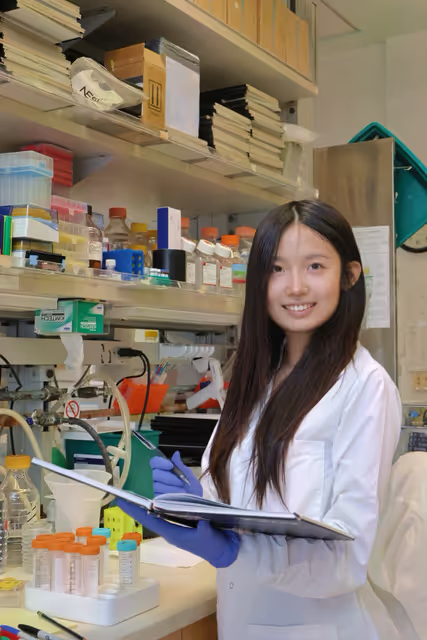%20(1).avif)
The Live Like Lou Foundation is proud to announce the inaugural recipients of its Graduate Fellowship program: He “Lilian” Gao of the University of California, San Diego, and Thao Nguyen of Stanford University. These promising researchers are leading bold new projects that aim to uncover the fundamental mysteries behind ALS and bring hope to those affected by the disease.
The Fellowship provides up to $50,000 annually for two years to outstanding PhD or MD/PhD students at key points in their research training. Recipients are selected not only for the significance and innovation of their projects, but also for their potential impact on the ALS field and their own scientific careers. “Launching our Graduate Fellowships illustrate Live Like Lou’s commitment to accelerating discovery and supporting tomorrow's scientific leaders, " said Wendy Faust, Live Like Lou Executive Director.

At UCSD, Gao is using cutting-edge technology to create detailed “maps” of what happens inside the brain and spinal cord cells of people with ALS. Her project centers on understanding how a specific protein, TDP-43, starts behaving abnormally in ALS, building up in places it shouldn’t and causing neurons to malfunction and die.
Gao uses an advanced tool called Multimodal MERFISH, which allows her to see, at the single-cell level, which genes are turned on or off, which proteins are clumping together, and how each cell responds to its neighbors. Imagine seeing not just every house on a map, but also everything happening inside each one that’s the level of detail this technology brings to ALS research.
Her work could answer a crucial question: why do specific neurons in ALS die while others survive, and how do surrounding support cells either help or hurt them? By uncovering these details, Gao’s research could reveal new targets for therapy and make it possible to slow or stop the disease.
Growing up in Guangdong Province, China, Gao ranked in the top 0.1% nationwide on university entrance exams, then graduated with highest honors from Shanghai Jiao Tong University. She joined UC San Diego’s renowned PhD program, quickly standing out as a truly exceptional scientist.
“Her presentation during her first year of graduate school was the best I’ve ever seen,” shared her mentor, Dr. Don Cleveland. “She is smart, dedicated, and already doing work that can change how we understand this disease.”

Nguyen, at Stanford, is tackling one of ALS’s most perplexing mysteries: Even though disease genes are spread throughout the nervous system, only alpha motor neurons die in ALS. Her project asks the question, “What makes these neurons so vulnerable, and can we turn them into survivors?”
Thao uses a state-of-the-art tool called Perturb-seq in the SOD1-G93A mouse model of ALS to pinpoint, from dozens of genes, which ones are causing alpha motor neurons to be so fragile. Then, she takes things a step further by using transcription factors. These special proteins adjust how genes are read. She tests whether she can “reprogram” vulnerable neurons to mimic the resilience of their naturally tougher neighbors. Imagine changing an at-risk house’s blueprint to stand up to storms like the strongest ones on the block.
Her research could lay a scientific foundation for new therapies that strengthen motor neurons, possibly halting ALS before too much damage is done.
Originally from Vietnam, Thao became the country’s top science student before earning her degree from MIT. At Stanford, her mentor, Dr. Aaron Gitler, describes her as “a genius with an extraordinary work ethic and creativity… her discoveries are already opening new doors in ALS research. I am constantly amazed by what she’s able to accomplish.”
By investing in fellows like Lilian Gao and Thao Nguyen, the Live Like Lou Foundation supports research exploring how ALS begins, why it devastates specific neurons, and what might be done to prevent it. Gao and Nguyen are not only asking the big questions but are equipped with the newest scientific tools to get real answers.
"I’m inspired by Lilian Gao and Thao Nguyen’s bold, innovative research. Gao’s work with spatial technologies and Nguyen’s genetic approaches offers new insights into ALS mechanisms and ways we may use to protect motor neurons from degeneration. Supporting scientists like them is central to our mission to accelerate discovery and bring hope to families impacted by ALS,” said Evangelos Kiskinis, PhD, Live Like Lou Scientific Director and Northwestern University Associate Professor, Neurology (Neuromuscular Disease), Neuroscience.
“Congratulations to these exceptional scientists on their awards as the Live Like Lou Foundation’s inaugural Graduate Fellows. We look forward to sharing the progress and discoveries from their work over the coming years,” said Faust. “Their efforts promise to open new paths for treatment and offer hope to the ALS community.”
